#sustainable energy and fuels
Explore tagged Tumblr posts
Text
#future renewable energy technology#green future energy#sustainable energy sources#sustainable energy and fuels#bis research
0 notes
Text
#clean energy#green energy#sustainability#climate change#environment#good news#hope#climate anxiety#fossil fuels
762 notes
·
View notes
Text
"The amount of electricity generated by the UK’s gas and coal power plants fell by 20% last year, with consumption of fossil fuels at its lowest level since 1957.
Not since Harold Macmillan was the UK prime minister and the Beatles’ John Lennon and Paul McCartney met for the first time has the UK used less coal and gas.
The UK’s gas power plants last year generated 31% of the UK’s electricity, or 98 terawatt hours (TWh), according to a report by the industry journal Carbon Brief, while the UK’s last remaining coal plant produced enough electricity to meet just 1% of the UK’s power demand or 4TWh.
Fossil fuels were squeezed out of the electricity system by a surge in renewable energy generation combined with higher electricity imports from France and Norway and a long-term trend of falling demand.
Higher power imports last year were driven by an increase in nuclear power from France and hydropower from Norway in 2023. This marked a reversal from 2022 when a string of nuclear outages in France helped make the UK a net exporter of electricity for the first time.
Carbon Brief found that gas and coal power plants made up just over a third of the UK’s electricity supplies in 2023, while renewable energy provided the single largest source of power to the grid at a record 42%.
It was the third year this decade that renewable energy sources, including wind, solar, hydro and biomass power, outperformed fossil fuels [in the UK], according to the analysis. Renewables and Britain’s nuclear reactors, which generated 13% of electricity supplies last year, helped low-carbon electricity make up 55% of the UK’s electricity in 2023.
[Note: "Third year this decade" refers to the UK specifically, not global; there are several countries that already run on 100% renewable energy, and more above 90% renewable. Also, though, there have only been four years this decade so far! So three out of four is pretty good!]
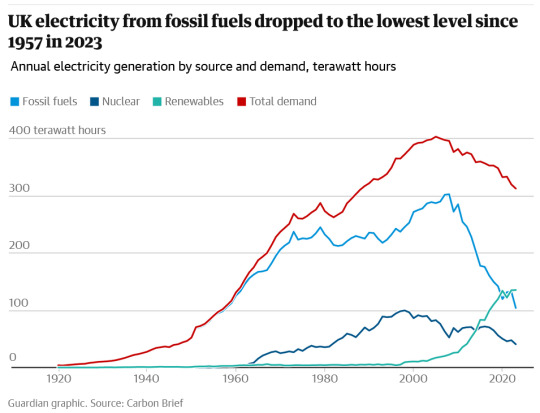
Dan McGrail, the chief executive of RenewableUK, said the data shows “the central role that wind, solar and other clean power sources are consistently playing in Britain’s energy transition”.
“We’re working closely with the government to accelerate the pace at which we build new projects and new supply chains in the face of intense global competition, as everyone is trying to replicate our success,” McGrail said.
Electricity from fossil fuels was two-thirds lower in 2023 compared with its peak in 2008, according to Carbon Brief. It found that coal has dropped by 97% and gas by 43% in the last 15 years.
Coal power is expected to fall further in 2024 after the planned shutdown of Britain’s last remaining coal plant in September. The Ratcliffe on Soar coal plant, owned by the German utility Uniper, is scheduled to shut before next winter after generating power for over 55 years.
Renewable energy has increased sixfold since 2008 as the UK has constructed more wind and solar farms, and the large Drax coal plant has converted some of its generating units to burn biomass pellets.
Electricity demand has tumbled by 22% since its peak in 2005, according to the data, as part of a long-term trend driven by more energy efficient homes and appliances as well as a decline in the UK’s manufacturing sector.
Demand for electricity is expected to double as the UK aims to cut emissions to net zero by 2050 because the plan relies heavily on replacing fossil fuel transport and heating with electric alternatives.
In recent weeks [aka at the end of 2023], offshore wind developers have given the green light to another four large windfarms in UK waters, including the world’s largest offshore windfarm at Hornsea 3, which will be built off the North Yorkshire coast by Denmark’s Ørsted."
-via The Guardian, January 2, 2024
#uk#united kingdom#england#scotland#wales#northern ireland#electricity#renewables#renewable energy#climate change#sustainability#hope posting#green energy#fossil fuels#oil#coal#solar power#wind power#environment#climate action#global warming#air pollution#climate crisis#good news#hope
393 notes
·
View notes
Text
Solarpunk is not archievable under Capitalism

Okay, let me make one thing very clear: We will never have a Solarpunk future as long as we live under capitalism. Again and again I will find people, who have fallen in love with the idea of Solarpunk, but are unwilling to consider any alternative to capitalism. So, please, let me quickly explain what that just is not gonna work out that way. There will be no Solarpunk under capitalism. Because the incentives of capitalism are opposing anything that Solarpunk stands for.
So let me please run over a few core points.
What is capitalism?
One issue that a lot of people do seem to have is understanding what capitalism even is. The defining attribute of capitalism is that "the means of production" (e.g. the things needed to create things) are privately owned and as such the private owners will decide both what gets created through it and who will get a share in any profits created through them. The ultimate goal in this is, to generate as large as a profit as possible, ideally more and more profit with every year. In real terms this means, that most of those means of productions in the way of companies and the like are owned mostly by shareholders, that is investors who have bought part of the company.
While capitalism gets generally thaught in schools with this entire idea of the free market, that... actually is not the central aspect of capitalism. I would even go so far to argue something else...
The market is actually not free and cannot be free
The idea of the free market is, that prices are controlled by the concept of supply and demand, with the buyer in the end deciding on whether they want to spend their money on something and being able to use that power to also enact control on the supplier.
However... that is actually not what is happening. Because it turns out that the end consumer has little influence, because they are actually not actively participating in the market. The market mainly is something that is happening between multimillionaires. It is their demand (or the lack thereoff) that is the influence. Investors, mainly. Which is logical. In a system, where the power to buy is deciding, the person who can spend multiple millions is gonna have a lot more power, than the person who has twenty bucks to their name.
Hence: 99% of all people are not participating in anything resembling a free market, and the remaining 1% are not interested in such a system.
Money under capitalism
One thing everyone needs to understand is, that for the most part money under capitalism is a very theoretical concept. It might be real for the average joe, who for the most part will not have more than maybe ten grand to their name, but it is not real to multi millionaires, let alone billionairs. Something that is going to be thrown around a lot is the concept of "net worth". But what you need to realize is that this net worth is not real money. It does not exist. It is the estimated worth of stuff these people own. Maybe houses and land, maybe private jets, maybe shares in companies and other things. These people's power and literal worth is tied to them being able theoretically able to sell these assets for money.
In fact a lot of these very rich people do not even have a lot of liquid money. So money they can spend. In fact there are quite a few billionairs who do not even own a million in liquidated money. The money they use in everyday life they borrow from banks, while putting their assets up as a security.
Why capitalism won't abolish fossil fuels
Understanding this makes it quite easy to understand why the capitalists cannot have fossil fuels ending. Because a lot of them own millions, at times billions in fossil fuel related assets. They might own a coal mine, or a fracking station, or maybe an offshore rig, or a power plant burning fossil fuels. At times they have 50% or more of their net worth bound in assets like this. If we stopped using fossil fuels, all those assets would become useless from one day to the next. Hence it is not in the interest of these very rich people to have that happen.
But it goes further than that, because politicians cannot have that happen either. Because the entire economy is build around these assets existing and being used as leverage and security for other investments.
Why capitalism won't build walkable cities and infrastructure
The same goes very much for the entire infrastructure. Another thing a lot of people have invested a lot of money into is cars. Not physical cars they own, but cars manufacturing. So, if we were building walkable cities with bikelanes and public transportation, a lot less people would buy cars, those manufactoring factories becoming worthless and hence once more money... just vanishing, that would otherwise be further invested.
Furthermore, even stuff like investing into EVs is a touch call to get to happen, because the investors (whose theoretical and not real money is tied to those manufacturers) want to see dividents at the end of the quartal. And if the manufactuerer invested into changing their factories to build EVs for a while profits would go down due to that investment. Hence, capitalism encourages them not doing that.
Why capitalism won't create sustainable goods
A lot of people will decry the fact that these days all goods you buy will break within two years, while that old washing machine your grandparents bought in 1962 is still running smoothly. To which I say: "Obviously. Because they want to make profits. Hence, selling you the same product every two years is more profitable."
If you wonder: "But wasn't that the same in 1962?" I will answer: "Yes. But in 1962 the market was still growing." See, with the post war economic boom more and more people got more divestable income they could spend. So a lot of companies could expect to win new costumers. But now the market is saturated. There is not a person who could use a washing machine, who does not have one. Hence, that thing needs to break, so they can sell another one.
The market incentive is against making sustainable, enduring products, that can be repaired. They would rather have you throw your clothing, your smartphone and your laptop away every two years.
Why workers will always be exploited under capitalism
One other central thing one has to realize about capitalism is that due to the privitization of the means of production the workers in a capitalist system will always be exploited. Because they own nothing, not even their own work. Any profit the company makes is value that has in the end been created by the workers within the company. (Please note, that everyone who does not own their work and cannot decide what happens to the value created by it is a worker. No matter whether they have a blue collar or a white collar job.)
That is also, why there is the saying: All profit is unpaid wages.
Under capitalism the profits will get divided up under the shareholders (aka the investors), while many of the workers do not even have enough money to just... live. Hence, good living standards for everyone are explicitly once more against the incentives of capitalism.
Why there won't be social justice under capitalism
Racism, sexism and also the current rise of queermisia are all a result of capitalism and have everything to do with capitalist incentives. Because the capitalists, so the people who own the means of production, profit from this discrimination. This is for two reasons.
For once having marginalized people creates groups that are easier exploitable. Due to discrimination these people will have a harder time finding a job and living quarters, making them more desperate and more likely to take badly paid jobs. Making it easier to exploit them for the profit of the capitalists.
A workforce divided through prejudice and discrimination will have a harder time to band together in unions and strikes. The crux of the entire system si, that it is build on the exploitation of workers - but if the workers stopped working, the system would instantly collapse. Hence the power of strikes. So, dividing the workforce between white and non-white, between queer and straight, between abled and disabled makes it easier to stop them from banding together, as they are too busy quaralling amoung themselves.
Why we won't decolonize under capitalism
Colonialism has never ended. Even now a lot of natural ressources and companies in the former colonies are owned by western interest. And this will stay that way, because this way the extraction of wealth is cheaper - making it more profitable. Colonialism has never ended, it has only gotten more subtle - and as long as more money can be made through this system, it will not end.
There won't be Solarpunk under capitalism
It is not your fault, if you think that capitalism cannot end. You have been literally taught this for as long as you can think. You never have been given the information about what capitalism is and how it works. You have never been taught the alternative mechanisms and where and when they were implemented.
You probably look at Solarpunk and think: "Yeah, that... that looks neat. I want that." And here is the thing: I want that, too.
But I have studied economics. Literally. And I can tell you... it does not work. It will not create better living situations for everyone. It will not save the world. Because in the end the longterm goals are not compatible with a capitalistic system.
I know it is fucking scary to be told: "Yeah, change the world you know in massive ways - or the world will end." But... it is just how the things are standing.
You can start small, though. Join a local party. Join a union. Join a mutual aid network. Help repair things. Help people just deal. Our power lies in working together. That is, in the end, what will get us a better future.

#solarpunk#anarchism#anti capitalism#unions#environmentalism#save the planet#explanation#sustainability#renewable energy#end fossil fuels#communism
769 notes
·
View notes
Text
#good news#science#environmentalism#climate change#co2#carbon emissions#hydrogen#green hydrogen#fossil fuel alternatives#green energy#airplanes#aviation#sustainable aviation#environment
179 notes
·
View notes
Text
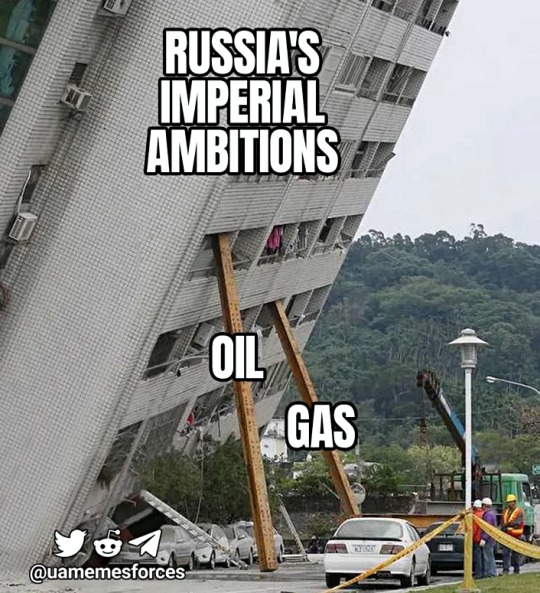
Russia and Iran are both terrorist states whose economies are propped up by fossil fuels.
If you'd like to see dictatorships and theocracies collapse, use less fossil fuel. Of course doing so is also helpful to the planet. 🌍
If I were an entrepreneur, I'd print up and sell stickers featuring pictures of Russian dictator Vladimir Putin and Iranian theocrat Ali Khamenei which people could place next to their thermostats and on their vehicle dashboards to remind them who is being empowered by oil and gas usage.
There is no downside to using less fossil fuel. Sustainable energy has a pro-democracy valence.
#russia#iran#dictatorships#fossil fuels#oil#gas#vladimir putin#ali khamenei#climate change#sustainable energy#stand with ukraine#invasion of ukraine#россия#владимир путин#путин хуйло#россия - террористиче��кая страна#علی خامنه ای#خامنه ای دیک است#ایران#слава україні!#героям слава!
64 notes
·
View notes
Text

chopped firewood. sustainable energy concept. wood texture. outdoor scene of everyday rural life. ecological fuel background
#firewood#wood#texture#background#energy#rural#fuel#chopped#outdoor#concept#ecological#sustainable#scene#everyday#life#wooden#pattern#material#timber#natural#rough#cut#brown#lumber#log#industry#rustic#stack#woodpile#pile
9 notes
·
View notes
Text
can i just rant abt how bad being broke all ur life fucks w ur relationship with food immensely. i dont think i have an ed necessarily i just feel like my relationship w food has been irreparably damaged cuz i either end up skipping meals to save money or when i finally have extra money to spend im not even that excited abt eating food anymore. cuz im just thinking abt how much money im "wasting" even when im trying to nourish my body :-) buying groceries, preparing and eating meals or even occasionally treating myself to takeout has become so unenjoyable for me i wish i just didnt have to eat at all haaaA
#hit bottom bc ive been lookinf into just drinking soylent for sustenance bc i dont feel like eating. thts a demon talking tho i must resist.#but like i try to be active 5x a week this is not sustainable cuz i need energy to exercise !!!#but then it makes me hungrier and i need more fuel.. which is more $$$... -__- grrrr
9 notes
·
View notes
Text
Book of the Day – The Age of Sustainable Development
Today’s Book of the Day is The Age of Sustainable Development, written by Jeffrey D. Sachs in 2015 and published by Columbia University Pres. Jeffrey D. Sachs is a world-renowned economics professor, author, educator, and global leader in sustainable economic development. The Age of Sustainable Development, by Jeffrey D. Sachs I chose this book because I often mention it when I present the…

View On WordPress
#Book Of The Day#book recommendation#book review#businesses#capitalism#carbon emissions#climate#corporations#corruption#deforestation#Economy#education#ethical concern#fossil fuel consumption#global warming#governments#green energy#industrial pollution#inequality#international organizations#knowledge#local communities#politics#Raffaello Palandri#science#Sustainable development#Technology#United Nations#United Nations&039; Sustainable Development Goals
4 notes
·
View notes
Text
If Tony Stark was real in our reality
all the villains he " "created" " would be, like:
- oil tycoon pissed that Stark has made renewable energy free for the whole state of NY and has plans to expand the tech to other states, countries, the world
- CEO of a predatory student loan company enraged by Stark making college widely affordable through an endless supply of scholarships
- corrupt politician whose career is over after his dirty laundry gets aired - in a leak that can't be traced to Stark Industries.. but also can't not be traced to it
------
Tony: attempts to make the world a better place with the power he has
Literally all the people who benefit from the world being a bad place: time to break out the tights and commit crimes???
#one of the mcu's many unforgivable acts of cowardice:#making all of tony's solo film villains just rivals from his weapon-making days#like be real babes#this man affects profit margins#thoughts#tony stark#iron man#consider how regular activists are frequently ASSASSINATED for going against these systems irl#tony: invents self-sustaining clean energy back in 2 0 1 2#tony: it's just a prototype 😇✨🥰😘😌✨#fossil fuel industry: quaking#@ the politicians they bought: do something???#the politicians -having flashbacks to the Congressional Hearing Clusterfuck of 2k11:#we can't????#the amount of good that tony was trying to do in the world#god had to nerf him. truly.
95 notes
·
View notes
Text
In today’s episode, Ariel chats with Heather MacKenzie, Executive Director of Solar Alberta, about transitioning to renewable energy deep in the heart of oil and gas country - in a just and sustainable way. Join us to learn about the history of the Solar Alberta organization, from its grassroots beginnings in neighbourhood solar projects, to dealing with (government-funded!) trolls online, all the way up to being the leading non-profit solar organization in Alberta and providing worker upskilling in a unique market.
You can go to https://solaralberta.ca to learn more, or connect with and follow them on Instagram, Facebook, Twitter, and LinkedIn.
Connect with Solarpunk Magazine at solarpunkmagazine.com and on Twitter @solarpunklitmag
Connect with Solarpunk Presents Podcast on Twitter @SolarpunkP, Mastodon @[email protected], or at our blog https://solarpunkpresents.com/
Connect with Ariel at her blog, on Twitter at @arielletje, and on Mastodon @[email protected]
Connect with Christina at her blog, on Twitter @xtinadlr, and on Mastodon @[email protected]
#solarpunk#solarpunk presents#solarpunk futures#podcast#Solar Alberta#Heather MacKenzie#energy transition#renewable energy#just transition#sustainable solutions#sustainability#Ariel#upskilling#YEG#Edmonton#Alberta#grassroots#fossil fuels#Alberta oil and gas#season one episode eight
20 notes
·
View notes
Text
"The prospects of the world staying within the 1.5C limit on global heating have brightened owing to the “staggering” growth of renewable energy and green investment in the past two years, the chief of the world’s energy watchdog has said.
Fatih Birol, the executive director of the International Energy Agency, and the world’s foremost energy economist, said much more needed to be done but that the rapid uptake of solar power and electric vehicles were encouraging.
“Despite the scale of the challenges, I feel more optimistic than I felt two years ago,” he said in an interview. “Solar photovoltaic installations and electric vehicle sales are perfectly in line with what we said they should be, to be on track to reach net zero by 2050, and thus stay within 1.5C. Clean energy investments in the last two years have seen a staggering 40% increase.” ...
The IEA, in a report entitled Net Zero Roadmap, published on Tuesday morning, also called on developed countries with 2050 net zero targets, including the UK, to bring them forward by several years.
The report found “almost all countries must move forward their targeted net zero dates”, which for most developed countries are 2050. Some developed countries have earlier dates, such as Germany with 2045 and Austria and Iceland with 2040 and for many developing countries they are much later, 2060 in the case of China and 2070 for India.
Cop28, the UN climate summit to be held in Dubai this November and December, offered a key opportunity for countries to set out tougher emissions-cutting plans, Birol said.
He wants to see Cop28 agree a tripling of renewable energy by 2030, and a 75% cut in methane from the energy sector by the same date. The latter could be achieved at little cost, because high gas prices mean that plugging leaks from oil and gas wells can be profitable...
He also called for Cop28 to agree a doubling of energy efficiency. “To reduce fossil fuel emissions, we need to reduce demand for fossil fuels. This is a golden condition, if we are to reach our climate goals,” he said.
Birol stopped short of endorsing the call that some countries have made for a full phase-out of fossil fuels by 2050 to be agreed at Cop28, but he said all countries must work on reducing their fossil fuel use."
-via The Guardian, September 26, 2023
#climate change#sustainability#climate anxiety#climate and environment#climate crisis#climate news#climate emergency#global warming#environment#climate action#iea#international politics#international energy agency#cop28#united nations#greenhouse gas emissions#fossil fuels#renewable energy#solar power#electric vehicles#ev#solar panels#climate tech#good news#hope#hope posting#hopepunk
425 notes
·
View notes
Text
Exploring the Dynamics of the Synthetic Fuels Market: A Sustainable Energy Solution
The Synthetic Fuels Market is rapidly gaining traction as a viable alternative in the quest for sustainable energy sources. With the growing concerns over climate change and the need to reduce carbon emissions, synthetic fuels offer a promising solution. These fuels, also known as e-fuels or renewable fuels, are produced through advanced processes that utilize renewable energy sources such as wind, solar, or hydroelectric power.
One of the primary drivers behind the surge in demand for synthetic fuels is the global shift towards greener energy solutions. Governments, industries, and consumers alike are increasingly recognizing the importance of reducing dependency on fossil fuels and embracing renewable alternatives. Synthetic fuels present a compelling option as they not only offer a cleaner energy source but also provide a pathway to decarbonizing sectors such as transportation, industrial manufacturing, and power generation.
The versatility of synthetic fuels is another factor contributing to their growing popularity. Unlike traditional fossil fuels, synthetic fuels can be easily integrated into existing infrastructure without the need for significant modifications. This means that vehicles, aircraft, and machinery powered by gasoline or diesel can seamlessly transition to synthetic fuels without compromising performance or efficiency. Additionally, synthetic fuels can be tailored to meet specific energy needs, offering a customizable solution for various applications.
Moreover, advancements in technology have significantly improved the efficiency and cost-effectiveness of synthetic fuel production. Innovative processes such as Power-to-Liquid (PtL) and Gas-to-Liquid (GtL) have made it possible to produce synthetic fuels on a commercial scale, driving down production costs and increasing accessibility. As a result, synthetic fuels are becoming increasingly competitive with conventional fossil fuels, further fueling their adoption across different sectors.
The transportation industry stands to benefit significantly from the widespread adoption of synthetic fuels. With concerns over air quality and emissions regulations becoming more stringent, many vehicle manufacturers are exploring alternative fuel options to meet regulatory requirements and consumer demand for greener transportation solutions. Synthetic fuels offer an attractive alternative, providing a bridge between conventional combustion engines and future zero-emission technologies such as electric vehicles and hydrogen fuel cells.
In addition to transportation, synthetic fuels find applications in other sectors such as power generation and industrial manufacturing. The ability to produce clean, reliable energy from renewable sources makes synthetic fuels an appealing choice for companies seeking to reduce their carbon footprint and meet sustainability targets. Furthermore, synthetic fuels offer energy security benefits by reducing reliance on imported oil and mitigating the geopolitical risks associated with fossil fuel dependence.
Looking ahead, the Synthetic Fuels Market is poised for significant growth as the world transitions towards a low-carbon economy. With ongoing advancements in technology, coupled with increasing environmental awareness and regulatory pressures, the demand for synthetic fuels is expected to soar in the coming years. As governments and industries continue to invest in renewable energy solutions, synthetic fuels are well-positioned to play a crucial role in shaping the future of energy production and consumption.
#energy#sustainability#renewable fuels#e-fuels#carbon emissions#alternative energy#transportation#industrial applications
2 notes
·
View notes
Text
Don't get me wrong, the fusion energy breakthrough is really cool from the angle of, like, scientific progress, but...



#...but it'd take approx. 13 billion of these fusion reactions to equal the output of hoover dam... for *one* year#all im saying is that WE ALREADY HAVE SOLUTIONS TO FOSSIL FUEL DEPENDENCY#solar and wind and hydroelectric could power the whole damn planet if we wanted#the solution to fossil fuel dependency is raidcal and sweeping reform to sustainable energy sources across the globe#nuclear fusion#fusion#science news#climate change#climate crisis#sustainable energy
7 notes
·
View notes
Text
A news story which has not gotten the attention it deserves here in North America this week is the intense heatwave in South and Southeast Asia. While Trump chants "drill drill drill" what's really needed is to get the planet to chill chill chill.
Thailand is reeling under the grip of a severe heatwave with temperatures soaring to record highs in some areas and authorities warned of harsher weather in the coming days. More than three dozen districts across Thailand’s 77 provinces have seen record temperatures in April, generally the hottest month of the year, with new highs beating records held as far back as 1958, according to data from the Thai Meteorological Department. Temperatures have topped 40 degrees Celsius (104 Fahrenheit) in 26 provinces this month, according to the agency. The northern province of Lampang has seen the highest temperature so far this year at 44.2 degrees, just shy of the highest temperature ever recorded in Thailand – 44.6 degrees – that was last seen in 2016 and 2023.
Thailand is roughly in the center of the affected area.
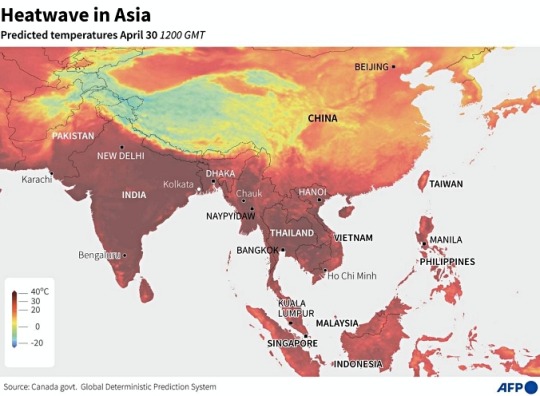
The Philippines, at the eastern end of the heatwave, is seeing a strain on its power supply.
Meanwhile, parts of the Philippines face potential disruption to electricity supplies as an intense heatwave fuels cooling demand and leaves power systems “overloaded”, according to President Ferdinand Marcos Jnr.
Schools in the Philippines have suspended in person sessions. There is talk of returning to an academic calendar which sees the school year end in March.
Students suffer in wilting heat, thwarting education efforts
In this audio report from ABC Australia, we hear how the current heatwave is closing in on the limit of human survivability in some areas.
Dangerous heatwave sweeps south east Asia
Any politician preaching increased use of fossil fuels is a danger to the planet.
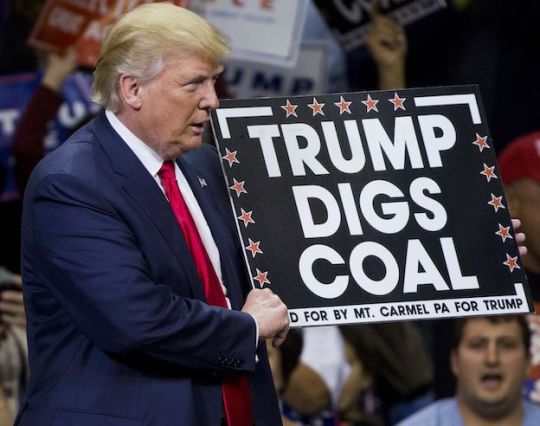
The transition to sustainability may occasionally be bumpy but any other road leads to climate dystopia.
NOTE: For all you Fahrenheit fans, here's a quick way to convert temperatures mentioned in some of the links.
Celsius to Fahrenheit Conversion | (°C to °F)
BTW, Asia won't be the only place hit with adverse climate incidents this year. The 2024 Atlantic Basin hurricane season is predicted to be well above average in number of storms.
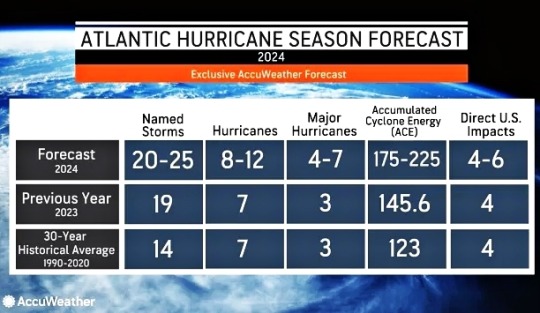
#climate change#the environment#heatwave#south asia#southeast asia#philippines#thailand#limits of human survivability#fossil fuels#republicans#donald trump#drill drill drill#trump digs coal#atlantic gurricane season#election 2024#sustainable energy#vote blue no matter who
7 notes
·
View notes
Text
Mm I love balancing my interests /gen It’s like cooking— add a lil bit of spooky podcasts, a dash of whimsical (and also spooky) puppets, and an unhealthy abundance of fourth wall breaking introspection, and you got good mental health, babyy
#sometimes you gotta cook something different but this particular dish is comfort food rn#life sustaining fuel#nothing like a home cooked meal#pay no attention to all of the meals I’ve burnt or the days I only have enough energy to make cheap ramen#posts for the void#welcome home#the magnus pod
3 notes
·
View notes